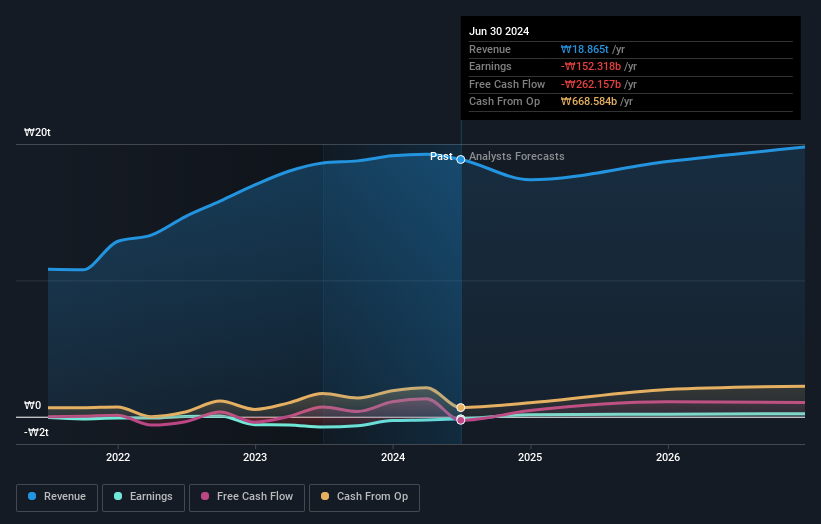- South Korea
- /
- Industrials
- /
- KOSE:A000150
Individual investors invested in Doosan Corporation (KRX:000150) copped the brunt of last week's ₩445b market cap decline

Key Insights
- The considerable ownership by individual investors in Doosan indicates that they collectively have a greater say in management and business strategy
- The top 11 shareholders own 51% of the company
- 39% of Doosan is held by insiders
To get a sense of who is truly in control of Doosan Corporation (KRX:000150), it is important to understand the ownership structure of the business. We can see that individual investors own the lion's share in the company with 44% ownership. In other words, the group stands to gain the most (or lose the most) from their investment into the company.
While insiders who own 39% came under pressure after market cap dropped to ₩3.3t last week,individual investors took the most losses.
Let's take a closer look to see what the different types of shareholders can tell us about Doosan.
Check out our latest analysis for Doosan

What Does The Institutional Ownership Tell Us About Doosan?
Institutions typically measure themselves against a benchmark when reporting to their own investors, so they often become more enthusiastic about a stock once it's included in a major index. We would expect most companies to have some institutions on the register, especially if they are growing.
As you can see, institutional investors have a fair amount of stake in Doosan. This implies the analysts working for those institutions have looked at the stock and they like it. But just like anyone else, they could be wrong. When multiple institutions own a stock, there's always a risk that they are in a 'crowded trade'. When such a trade goes wrong, multiple parties may compete to sell stock fast. This risk is higher in a company without a history of growth. You can see Doosan's historic earnings and revenue below, but keep in mind there's always more to the story.

Hedge funds don't have many shares in Doosan. Looking at our data, we can see that the largest shareholder is the CEO Jeongwon Park with 15% of shares outstanding. National Pension Service is the second largest shareholder owning 7.9% of common stock, and Geewon Park holds about 5.1% of the company stock.
A closer look at our ownership figures suggests that the top 11 shareholders have a combined ownership of 51% implying that no single shareholder has a majority.
While it makes sense to study institutional ownership data for a company, it also makes sense to study analyst sentiments to know which way the wind is blowing. There are a reasonable number of analysts covering the stock, so it might be useful to find out their aggregate view on the future.
Insider Ownership Of Doosan
The definition of company insiders can be subjective and does vary between jurisdictions. Our data reflects individual insiders, capturing board members at the very least. The company management answer to the board and the latter should represent the interests of shareholders. Notably, sometimes top-level managers are on the board themselves.
Insider ownership is positive when it signals leadership are thinking like the true owners of the company. However, high insider ownership can also give immense power to a small group within the company. This can be negative in some circumstances.
Our information suggests that insiders maintain a significant holding in Doosan Corporation. Insiders own ₩1.3t worth of shares in the ₩3.3t company. That's quite meaningful. It is good to see this level of investment. You can check here to see if those insiders have been buying recently.
General Public Ownership
The general public-- including retail investors -- own 44% stake in the company, and hence can't easily be ignored. This size of ownership, while considerable, may not be enough to change company policy if the decision is not in sync with other large shareholders.
Next Steps:
It's always worth thinking about the different groups who own shares in a company. But to understand Doosan better, we need to consider many other factors. Take risks for example - Doosan has 1 warning sign we think you should be aware of.
If you are like me, you may want to think about whether this company will grow or shrink. Luckily, you can check this free report showing analyst forecasts for its future.
NB: Figures in this article are calculated using data from the last twelve months, which refer to the 12-month period ending on the last date of the month the financial statement is dated. This may not be consistent with full year annual report figures.
New: Manage All Your Stock Portfolios in One Place
We've created the ultimate portfolio companion for stock investors, and it's free.
• Connect an unlimited number of Portfolios and see your total in one currency
• Be alerted to new Warning Signs or Risks via email or mobile
• Track the Fair Value of your stocks
Have feedback on this article? Concerned about the content? Get in touch with us directly. Alternatively, email editorial-team (at) simplywallst.com.
This article by Simply Wall St is general in nature. We provide commentary based on historical data and analyst forecasts only using an unbiased methodology and our articles are not intended to be financial advice. It does not constitute a recommendation to buy or sell any stock, and does not take account of your objectives, or your financial situation. We aim to bring you long-term focused analysis driven by fundamental data. Note that our analysis may not factor in the latest price-sensitive company announcements or qualitative material. Simply Wall St has no position in any stocks mentioned.
About KOSE:A000150
Doosan
Engages in the heavy industry, machinery manufacturing, and apartment construction businesses in South Korea, the United States, rest of Asia, the Middle East, Europe, and internationally.
Good value with reasonable growth potential.


